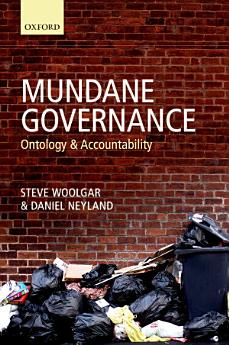Mundane Governance: Ontology and Accountability
Nov 2013 · OUP Oxford
Ebook
328
Pages
family_home
Eligible
info
reportRatings and reviews aren’t verified Learn More
About this ebook
What is to be made of the outcry when newly issued recycling "wheelie" bins are discovered to contain microchips for weighing and evaluating householders' rubbish? The angry accusations that speed cameras are generating excessive income for the government? The consternation at the measures taken by airports to heighten security in the wake of the increased threat of terrorist attacks? These increasingly widespread reactions to ordinary events and everyday phenomena share a common theme. They all embody concerns about the ways in which our lives are increasingly regulated and controlled in relation to ordinary objects and technologies. This book takes these concerns as the starting point for exploring the ways in which relations of governance and accountability in contemporary life are organized around ordinary, everyday, pervasive objects and technologies. In contrast to the contemporary literature on governance, the book argues for the importance of examining how accountability relations are enacted on the ground, in relation to mundane objects and technologies. In particular, it is crucial to understand how governance and accountability are mediated through material relations involving ordinary everyday objects and technologies. The book argues that the key to understanding governance is to focus on political constitution at the level of ontology rather than just on the traditional politics of organization, structure, and human compliance. The term ontology is used here to draw attention to the social and cultural processes whereby the nature and existence of ordinary things come to matter. The argument is developed in relation to a wide variety of empirical materials drawn from three main areas of everyday life: waste management and recycling; the regulation and control of traffic (especially speed cameras and parking); and security and passenger movement in airports.
About the author
Professor Steve Woolgar is a Sociologist who holds the Chair of Marketing at the Saïd Business School, University of Oxford. He was formerly Professor of Sociology, Head of the Department of Human Sciences and Director of CRICT (Centre for Research into Innovation, Culture and Technology) at Brunel University. He has held Visiting Appointments at McGill University (Sociology '79-81), MIT (Program in Science Technology and Society, '83-84), Ecole Nationale Superieure des Mines, Paris (Centre de Sociologie de l'Innovation, '88-89) and UC San Diego (Sociology, '95-96). From 1997-2002 he was Director of the ESRC Programme Virtual Society? - the social science of electronic technologies a £3m venture comprising 22 research projects throughout the UK. Daniel Neyland is a Reader in Sociology, Goldsmiths College. He has previously been Lecturer in the Management School, at the University of Lancaster, and Senior Research Fellow at the Saïd Business School, University of Oxford. His research interests cover issues of governance, accountability and ethics in forms of science, technology and organization.
Rate this ebook
Tell us what you think.
Reading information
Smartphones and tablets
Install the Google Play Books app for Android and iPad/iPhone. It syncs automatically with your account and allows you to read online or offline wherever you are.
Laptops and computers
You can listen to audiobooks purchased on Google Play using your computer's web browser.
eReaders and other devices
To read on e-ink devices like Kobo eReaders, you'll need to download a file and transfer it to your device. Follow the detailed Help Center instructions to transfer the files to supported eReaders.






